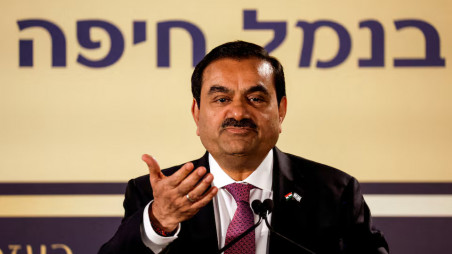
Experts say the US case against Gautam Adani looks strong, but extradition is not possible
Legal experts stated that although the U.S. fraud investigation against Indian billionaire Gautam Adani seems to have supporting documentation that will assist prosecutors present a compelling case, the tycoon is unlikely to be extradited to face trial anytime soon.
Adani was charged by federal prosecutors in Brooklyn last month with bribing Indian officials to persuade them to purchase electricity generated by Adani Green Energy (ADNA.NS), opens new tab, a division of his Adani Group conglomerate, and then deceiving American investors by falsely claiming that the company had anti-corruption measures in place.
Adani, his nephew Sagar Adani, and another official from the Adani Group were accused of conspiracy and securities fraud. The charges included conspiracy to violate the Foreign Corrupt Practices Act (FCPA) against five individuals connected to Azure Power Global (AZREF.PK), opens new tab, a previously listed firm that was also allegedly implicated.
According to Azure, those accused were no longer employed by the company, and the company had cooperated with the investigation. The claims have been deemed “baseless” by Adani Group, which has promised to pursue “all possible legal recourse.”
There is no arrest of Gautam Adani. Since the indictment, he has appeared in public at least twice in India, notably on December 9 at an event that Prime Minister Narendra Modi also attended.
The indictment claims that prosecutors discovered ledgers of the purported payments on Sagar Adani’s cell phone, which they referred to as “bribe notes.” Additionally, according to the prosecution, Gautam Adani sent a copy of the search warrant and grand jury subpoena that the FBI had served on his nephew on March 17, 2023, to himself via email.
According to experts, prosecutors may use those electronic records as crucial proof that Sagar Adani and Gautam Adani knew they had deceived investors by keeping the investigation a secret and claiming to have robust anti-corruption procedures when, in reality, they had paid bribes.
Stephen Reynolds, a former federal prosecutor and current partner at the law firm Day Pitney, stated, “The allegations include references to corroborating material, and that always provides for a stronger case.”
Prosecutors may, in fact, have difficulties. According to Paul Tuchmann, a former federal prosecutor in Brooklyn and current partner at the law firm Wiggin & Dana, Gautam Adani might contend that he had no direct influence over the claims the company made to investors on its anti-bribery policies.
According to Mark Cohen, a former federal prosecutor in Brooklyn and current partner at the law firm Cohen & Gresser, prosecutors may also have trouble getting live testimony from witnesses in India because the process might need help from New Delhi and the government might be hesitant to allow testimony that could cast Indian officials in a negative light.
On Friday, India’s foreign ministry cited a statement from November 29 in which it claimed that Washington had not requested any information on the case and described it as a matter between private companies and the US Justice Department.
Regarding whether the United States had requested that India extradite Gautam Adani, the U.S. Justice Department remained silent.
“FOLLOW THE RULES”
In recent public remarks, Adani Group and Adani himself emphasized that the executives of the group had not been accused of breaking the FCPA.
The maximum penalty for conspiracy to violate the FCPA is five years in prison. Each of the Adani Group defendants, including Gautam Adani, faces a maximum sentence of 20 years in jail for the fraud charges against them.
According to Drew Rolle, deputy chief of the Brooklyn U.S. Attorney’s office’s business and securities fraud department, his office has an obligation to safeguard the integrity of the country’s capital markets.
Numerous convictions in overseas bribery cases involving U.S. connections have been obtained by the agency. The former finance minister of Mozambique was convicted by jurors in August of fraud and money laundering conspiracy for embezzling loan payments that he had said were intended for economic development projects.
According to Rolle, when enterprises such as Adani’s purportedly deceive investors, it hurts honest businesses.
He stated, “It’s not only a bribery case, but also an important securities enforcement case,” during a conference organized by the Practicing Law Institute in New York on December 6. “If you’re going to access our capital markets, you’re going to play by the rules.”
All Categories
Recent Posts
Tags
+13162306000
zoneyetu@yahoo.com



